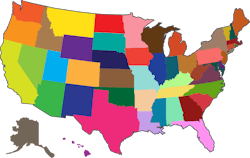HHS to expand access to COVID-19 treatments in underserved communities
The U.S. Department of Health and Human Services (HHS) plans to spend $150 million to increase access to COVID-19 monoclonal antibody therapeutic treatments for patients in vulnerable communities across the country, according to a news release from the department.
The types of initiatives that will be funded include additional staffing, infusion center capacity in traditional and non-traditional health care settings, and equipment to administer the intravenous infusion treatments.
This effort will focus on communities that have high levels of COVID-19 and are determined to be particularly vulnerable based on the Centers for Disease Control and Prevention (CDC) social vulnerability index. Social vulnerability refers to the potential negative effects on communities caused by external stresses on human health including disease outbreaks. The index uses 15 U.S. census variables to help local officials identify vulnerable communities.
CDC has found that COVID-19 is affecting underserved communities and ethnic minorities disproportionately largely due to poverty and uneven access to healthcare in those communities. HHS said it also will consider communities in which monoclonal antibody treatments currently are available and equitable access can be increased quickly for underserved populations.
The monoclonal antibody therapeutics neutralize the virus that causes COVID-19 to prevent progression of disease. Based on the available evidence of safety and efficacy, the National Institutes of Health (NIH) recently updated its guidelines to recommend use of the treatments for those non-hospitalized COVID-19 patients who are at high risk of progressing to severe disease.

